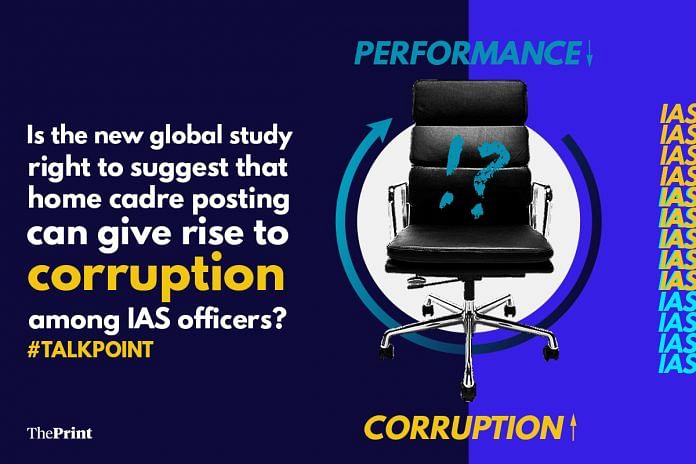A research paper by scholars from UC Berkeley, Booth and LSE published preliminary results that suggests civil servants assigned to their home state cadre are deemed to be more corrupt and less able to resist political pressure. The paper titled “Social Proximity and Bureaucrat Performance: Evidence from India” provides evidence that home state cadre adversely impact performance.
ThePrint asks: Is the new global study right to suggest that home cadre posting can give rise to corruption among IAS officers?
IAS officers in their home states are likely to be more vulnerable than outsiders
 SY Quraishi
SY Quraishi
Former Chief Election Commissioner of India
We need to acknowledge that this is a professional study conducted by scholars from three eminent institutions. You can’t casually question their findings. You can just provide your impression about their findings. It is a question of a thoroughly conducted research study versus the impression one can have from experience.
While we must take their conclusions seriously, we should also remember there are exceptions to every conclusion. One cannot make blanket statements about all home cadre officers or outsiders. What we can say is that officers deputed to their home cadres are likely to be more vulnerable than outsiders. This isn’t a question of all being corrupt or innocent. There are always shades of grey.
The cadre allotment policy that provides for half-insiders and half- outsiders is actually based on this concept.
Even in the Election Commission of India, we have been cognisant of this fact. When we allocate observers, we ensure that they are not from the same state as the one where they are sent. The vulnerability of someone who has family, friends and connections in the same state to pressure or influence them is much higher. That’s why we remove officers from their home district or town, besides those who have been posted in the same place for more than three years (and have developed roots there).
The other question raised, that insiders understand the problems better than outsiders, is indeed true, but not entirely.
IAS officers are thoroughly trained to address the problems of the state to which they are posted. They are given language training in case they are moving to a state with a different language. An IAS officer from UP or Bihar deputed in Tamil Nadu will speak Tamil as fluently as a native. This is all a part of the rigorous training they undergo.
Finally, it’s a question of individual disposition. There can be a corrupt outsider as much as a corrupt insider. But the vulnerability of an insider is a bit higher, as the study shows.
It must be remembered that the role of outsiders — IAS or IPS — in keeping fissiparous tendencies in different parts of the country is subtle but enormous.
The study on IAS officials is not based on data like cases filed or convictions secured
 Sanjay Dixit
Sanjay Dixit
Senior IAS of Rajasthan cadre and former secretary of the Rajasthan Cricket Association.
I am reminded of Mark Twain quoting Benjamin Disraeli: “There are three kind of lies: lies, damned lies and statistics”. The present statistical calisthenics seem to fit the description perfectly.
The conclusion is seriously problematic. We know that Hindi-speaking states have historically contributed a disproportionately large number of officers to the IAS. This is where the conclusions seem to have gone awry. Statistically, the comparison gets skewed because the largest cohort belongs to Hindi-speaking officers spread across the length and breadth of the country, with many states not even able to fill their quota of ‘inside officers’.
Secondly, the exercise is based on the perceptions of people working within the states. It is not based on hard data on corruption cases filed, convictions secured, or promotions denied. It is possible for me to argue that a home officer is likely to be looked at more closely within known networks, revealing more negative information about him than for an officer who is not so well known to local networks.
Thirdly, the largest number of directly recruited officers is posted in their neighbouring states. There is little or no deterrence for an officer posted in a neighbouring state to access or be accessed by the so-called networks, if he so chooses.
Perceptions about IAS officers and corruption are not decided by surveys
 Shailaja Chandra
Shailaja Chandra
Former Chief Secretary, Delhi
A research study reported in today’s newspapers -Social Proximity and Bureaucrat Performance: Evidence from India, by Bertrand and Burgess is sure to raise the hackles of not just IAS officers but also the citizens of several states.
The main finding of the research (albeit only a Draft), is that “home state allocated officers perform worse than comparable officers were allocated to non-home states andare deemed to be more corrupt and less able to withstand illegitimate political pressure.”
It is not the finding per se that is maddening, but the sweeping assumptions that lie behind the torrent of statistical tables and questionable data.
The most outrageous part is the statement that Karnataka and Bihar are among the most corrupt regions of India. This is without basis and to make matters worse, adding without explanation “the negative effect is close to 0 in Punjab, West Bengal and Andhra Pradesh.” Bizarre!
The so- called perceptions about corruption were arrived at through a survey the researchers said was based on scores provided by a “wide range of stakeholders in each state, ranging from IAS officers, state civil servants, politicians (MLAs) to representatives of media, business and NGOs”. The questions used in the survey could not be found.
A handful of MLAs, companies, media houses and NGOs in each state do not constitute what can be called a cross-section of opinion makers -given that we’re talking about states with populations as large as Brazil, France, Germany and Italy!
It is also not clear whether the IAS officers referred to in the study include state civil service officers inducted into the IAS or are just direct recruits. Of the 5,000 officers in position, around 30% have been inducted into the IAS. Had this been explained, a lot of chafing that this study is bound to create could have been avoided.
Surveys on insiders and outsiders do not determine perceptions about susceptibility to corruption. The Prime Minister has asked for young IAS officers (direct recruits by implication) to be posted in the “aspirational” Indian districts. The real perception is that they are competen tand incorruptible. Indeed, it is a widely held public perception too, without surveys or research!
It is necessary to ensure IAS officers don’t get their home state as their cadre
 Rajgopal Singh
Rajgopal Singh
Journalist, ThePrint
“Power tends to corrupt, and absolute power corrupts absolutely,”
British historian Lord Acton wrote way back in 1887. In India, the real power is wielded by bureaucrats.
Bureaucracy was supposed to be the steel frame of India’s growth story. But one should have no hesitation in saying that the frame is gathering rust. There are many reasons for this, corruption being one of the most prominent.
The research paper in question concludes that IAS officers assigned to their home states tend to be more corrupt. It’s not a revelation. It should not surprise anybody.
The responsibility of implementing any scheme and ensuring that it reaches the last beneficiary rests with civil servants. And in the Indian bureaucracy, once you are in, it’s nearly impossible to move you out. So, the impunity around bureaucrat incentivises corruption. When was the last time you heard of a bureaucrat being penalised for corrupt practices?
When bureaucrats serve in their home states, there is added incentive to be corrupt. First and foremost is the deep-rooted social network always at the disposal of ‘DM saheb’. And since human beings are social animals, there are multiple levers available for politicians to control the bureaucrat. It provides the perfect environment for give-and-take. In our society, it’s a disgrace if you are not able to help your people out of turn, as if the success of a bureaucrat lies in ensuring the well-being of their relatives and neighbours.
As with so many problems, the solution is simple but tough to implement: just make a rule that bureaucrats will not get assigned to cadres of their home state.
Compiled by Deeksha Bhardwaj, Journalist at ThePrint.




The basic principles of management talk of authority responsibilities balance. In our system while the politician takes the blame for failure of policy there is virtually no penalty on the bureaucracy responsible for the implementation. While bureaucracy has all the authority they have virtually no answerability. Yet to hear of a bureaucrator even a lowly clerk being sacked for a policy not being implemented in time or in correct manner.
It is this impunity that allows corruption especially when added to discretionary powers. Whether home state or not unless this imbalance is addressed the situation willnot improve.
The Home cadre is not the only reason for corruption. Actually Government should promote incentives for officers and home cadre is one of such incentvies. Competitions for getting such Job is too much but it still not attracts to many intellectuals.
It is an open fact that most of the IAS officers are corrupt. Here corrupt do not mean only taking bribe. Corruption can be use of official vehicle for personal purpose, engage office peon in there personal residence, take undue advantage from the business men etc. Secondly, one of IAS officers here mentioned about training. But IAS officers are lacking in manners, behaviour towards common citizen. They only give resprct to there political masters.